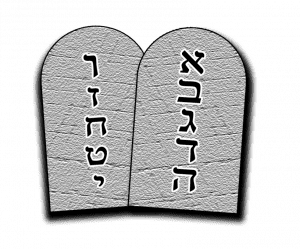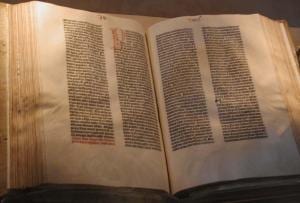 The entire book of Joshua is the purported story of how the forces of Israel, under the divine leadership of Joshua, entered into the land of promise from the east, crossing the Jordan, and in a lightening series of armed attacks conquered the entire land, central, north and south, defeating the tribes of people living there, precisely as YHWH had promised. Now, of course, as careful study of the archaeological realities, the sociological and political facts, and the complex nature of the texts themselves, have shown, this simple and decisive tale cannot be historically true, even in its very broadest outlines. Joshua is theological fiction, designed not to relate history, but instead to anchor a religiously struggling Israel to a sanctified story of God’s trustworthy fulfillment of divine promise, a fulfillment that can still be trusted during times of danger and religious confusion. The book of Joshua was not written during the time it purports to describe, but much later under the editorial hand of the Deuteronomic historian, who wrote with a clear and specific theological concern driving the writing. Hence, Joshua must be read for what it is, namely a theological sermon urging a later Israel (7th-6th century BCE?) to return to the God who made them who they were and are.
The entire book of Joshua is the purported story of how the forces of Israel, under the divine leadership of Joshua, entered into the land of promise from the east, crossing the Jordan, and in a lightening series of armed attacks conquered the entire land, central, north and south, defeating the tribes of people living there, precisely as YHWH had promised. Now, of course, as careful study of the archaeological realities, the sociological and political facts, and the complex nature of the texts themselves, have shown, this simple and decisive tale cannot be historically true, even in its very broadest outlines. Joshua is theological fiction, designed not to relate history, but instead to anchor a religiously struggling Israel to a sanctified story of God’s trustworthy fulfillment of divine promise, a fulfillment that can still be trusted during times of danger and religious confusion. The book of Joshua was not written during the time it purports to describe, but much later under the editorial hand of the Deuteronomic historian, who wrote with a clear and specific theological concern driving the writing. Hence, Joshua must be read for what it is, namely a theological sermon urging a later Israel (7th-6th century BCE?) to return to the God who made them who they were and are.
The end of Joshua’s account in chapter 24 is the parade example of that central goal, and the fact that preachers over the centuries have found ripe fruit for admonitory homilies based on this chapter makes the original goal of the chapter even more certain: in short, we must all choose “this day whom we will serve,” and for Joshua, as well as for us, the correct answer is, “we will serve YHWH.” The fact that the choice of YHWH must again and again be made suggests beyond a doubt that other choices, other gods, have consistently and frustratingly been made. For Deuteronomy and that theology, there can be but one God, and to choose any other is to fall into that most egregious of evils, idolatry. Good grief, shouts Joshua, standing at Shechem, after the enormous victories of YHWH and Israel over the former inhabitants of the land of promise, how in the world can anyone make a different choice of which God to serve? Have you not just witnessed the power of God writ large in our lives? Though the lectionary collectors leave out of their textual choice the actions of YHWH that should lead any reasonable person to choose to worship YHWH (Josh.24:3-13), it is those verses that enumerate what YHWH has done for Israel and should determine for all time their choice of YHWH as their God. But of course that tale of divine action in and of itself was never sufficient to determine an unwavering choice for YHWH. And, unfortunately, no matter how often we modern Christians avow our allegiance to God in Jesus in worship and prayer, the need to choose that God over against any and all others is always necessary. For, after all, there is a plethora of other attractive gods out there awaiting our fervent allegiance.
The Joshua story emphasizes that constant danger of divine options for any would-be believer. When a believer is convinced that her god, when construed rightly, when parsed correctly, when aligned with ideas she espouses energetically, she can eagerly and without question exclaim with her Israelite forebears, “Far be it from us that we should forsake YHWH to serve other gods, for it is YHWH our God who brought us out of the land of Egypt” (Josh.24:16). When things are going your way, the choice of the God who you assume has favored you is quite simple. But Joshua is not taken in by such comfortable and expected protestations of worship. He thunders at those gathered at Shechem (and we may listen in), “You cannot serve YHWH! YHWH is a zealous God (that is a God who demands single-minded devotion and loyalty); YHWH will not forgive your transgressions and sins. If you abandon YHWH and serve foreign gods, YHWH will turn and do you harm and swallow you whole, after having done you good” (Josh 24:19-20). The fact that Joshua warns them “if you abandon” suggests strongly that in the land of promise, where they now live, they in fact have abandoned YHWH and chosen the gods of the Amorites “ in whose land you are now living’ (Josh. 24:15). This accusation is of course completely incongruous, tumbling from the mouth of the Israelite leader just after battle victories and well before they are in fact actually settled in the land. Joshua simply anticipates what he knows will certainly occur; the people will abandon YHWH and choose other gods. By the time the book of Joshua was written, that abandonment had happened, as any reading of the great prophets will attest.

After being accused of YHWH rejection, the people cry out in anguish, “No, we will serve YHWH” (Josh.24:21). Joshua remains unconvinced, as he imagines YHWH to be, too. “You are witnesses against yourselves,” he shouts, “that you have chosen YHWH to serve.” Indeed, they respond, “we are witnesses” (Josh. 24:22). What this exchange appears to mean is that the people announce to Joshua that they will prove their devotion to YHWH by what they do, not merely by what they say they will do. As a result, Joshua “made a covenant with the people that day, and made statutes and ordinances for them at Shechem” (Josh.24:25). Here the language of Deuteronomy is revealed, since “statutes and ordinances” are the hallmark of that author’s summation of the demands of YHWH on the people who would follow God’s way. Then Joshua, like Moses before him, “wrote these words in the book of the Torah of God, and took a large stone, and set it up there under the oak in the sanctuary of YHWH” (Josh.24:26). That stone, that ancient immovable rock, “shall be a witness against us, for it has heard all the words of YHWH spoken to us” (Josh.24:27). The stone becomes an unbreakable witness to what we have vowed, because it has observed and recorded within its unbreakable surface all we have promised to do. Lest we forget our vows, one look at the stone will convict us of our dereliction of duty to YHWH.
And so what about us? Have we vowed to follow YHWH to the exclusion of all other divine options? If so, where is our stone that can serve to remind us of our vow? When we turn to the modern equivalents of the gods of the Amorites, who is it, what is it, that can call us back to our original devotion? This remarkable and challenging text is a constant call to us to return to the ways of our God, the ways of justice and righteousness. Anyone who reads the Hebrew Bible with any care cannot easily escape its near-constant demand for us to live in ways that show evidence of justice and righteousness. When Black Lives do not matter to us, what is the call of God on those of us who are white? To do justice! When we are taught by reputable and trusted scientists that wearing masks protects us and those around us, what is the call of God on those who claim belief in that God yet refuse mask wearing as a sign of “personal freedom”? To enact righteousness! When elections present choices between those who refuse to take seriously the science of climate change and those who strive not only to take it seriously but also propose policies to effect action against a warming planet, what is the call of God on those who will not learn the truth? To do justice for the planet and righteousness for all creatures on it! Joshua’s call to choose today whom we will serve echoes loudly in our own modern ears, bidding us to seek our stone of witness to remind us of what it means actually to follow the God who loves us and calls us to the actions of justice and righteousness.
(Images from Wikimedia Commons)











